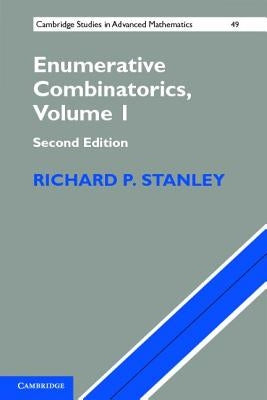1
/
of
1
Cambridge University Press
Enumerative Combinatorics: Volume 1
Enumerative Combinatorics: Volume 1
Regular price
€248,95 EUR
Regular price
Sale price
€248,95 EUR
Shipping calculated at checkout.
Quantity
Couldn't load pickup availability
Richard Stanley's two-volume basic introduction to enumerative combinatorics has become the standard guide to the topic for students and experts alike. This thoroughly revised second edition of Volume 1 includes ten new sections and more than 300 new exercises, most with solutions, reflecting numerous new developments since the publication of the first edition in 1986. The material in Volume 1 was chosen to cover those parts of enumerative combinatorics of greatest applicability and with the most important connections with other areas of mathematics. The four chapters are devoted to an introduction to enumeration (suitable for advanced undergraduates), sieve methods, partially ordered sets, and rational generating functions. Much of the material is related to generating functions, a fundamental tool in enumerative combinatorics. In this new edition, the author brings the coverage up to date and includes a wide variety of additional applications and examples, as well as updated and expanded chapter bibliographies. Many of the less difficult new exercises have no solutions so that they can more easily be assigned to students. The material on P-partitions has been rearranged and generalized; the treatment of permutation statistics has been greatly enlarged; and there are also new sections on q-analogues of permutations, hyperplane arrangements, the cd-index, promotion and evacuation, and differential posets.
Author: Richard P. Stanley
Publisher: Cambridge University Press
Published: 12/12/2011
Pages: 642
Binding Type: Hardcover
Weight: 2.45lbs
Size: 9.10h x 6.30w x 1.80d
ISBN: 9781107015425
Author: Richard P. Stanley
Publisher: Cambridge University Press
Published: 12/12/2011
Pages: 642
Binding Type: Hardcover
Weight: 2.45lbs
Size: 9.10h x 6.30w x 1.80d
ISBN: 9781107015425
About the Author
Stanley, Richard P.: - Richard P. Stanley is a Professor of Applied Mathematics at the Massachusetts Institute of Technology. He is universally recognized as a leading expert in the field of combinatorics and its applications to a variety of other mathematical disciplines. In addition to the seminal two-volume book Enumerative Combinatorics, he is the author of Combinatorics and Commutative Algebra (1983) as well as more than 100 research articles in mathematics. Among Stanley's many distinctions are membership in the National Academy of Sciences (elected in 1995), the 2001 Leroy P. Steele Prize for mathematical exposition and the 2003 Schock Prize.
Share


